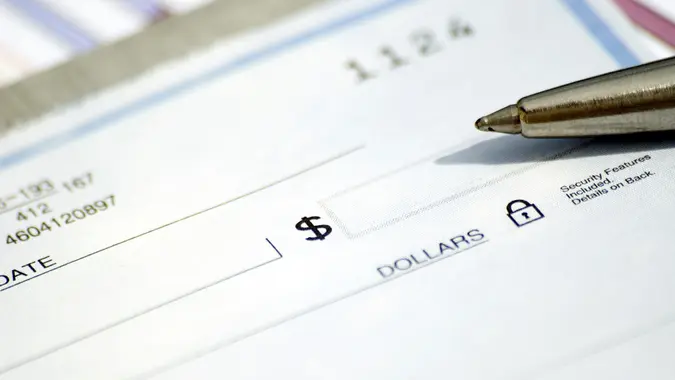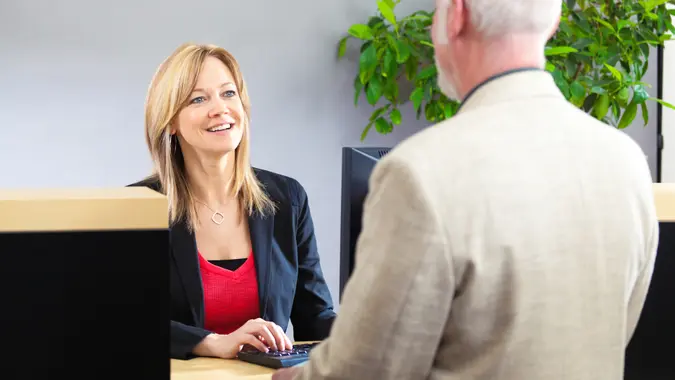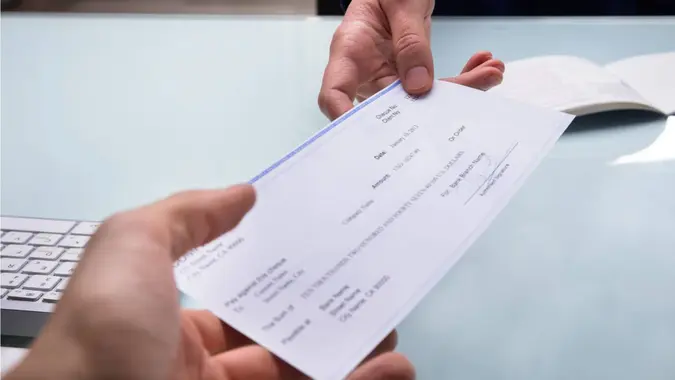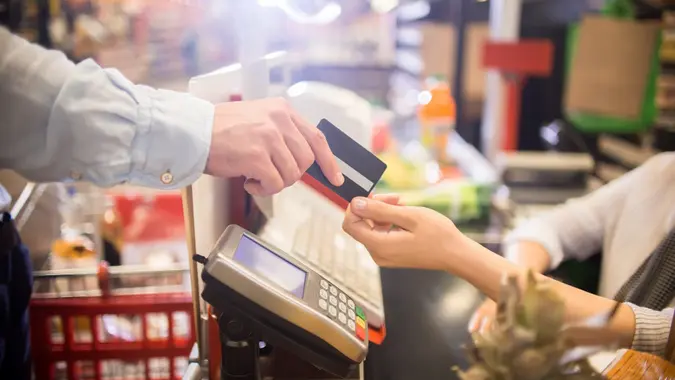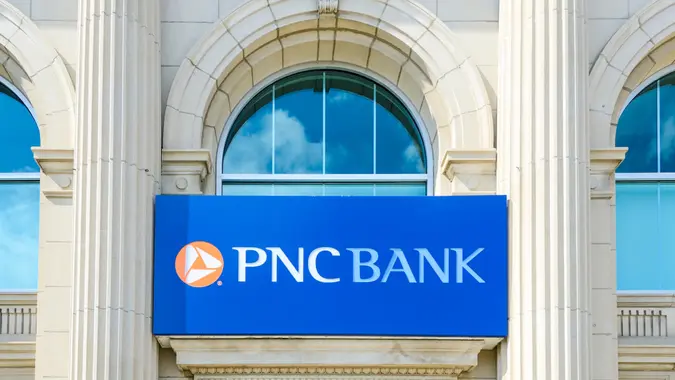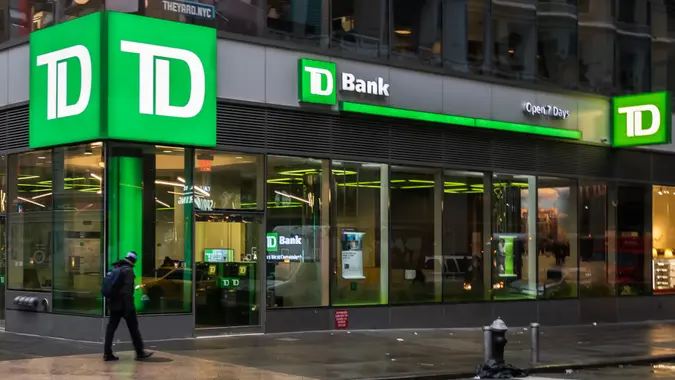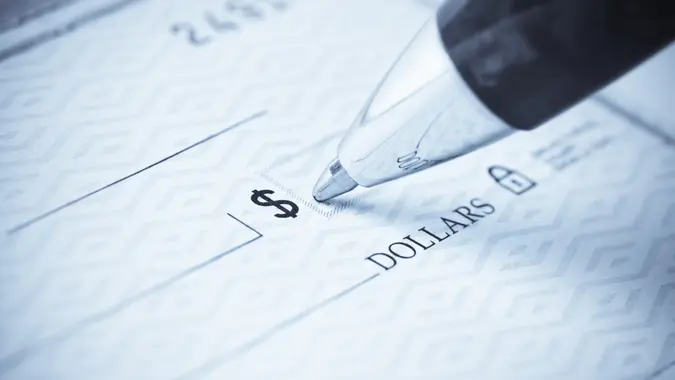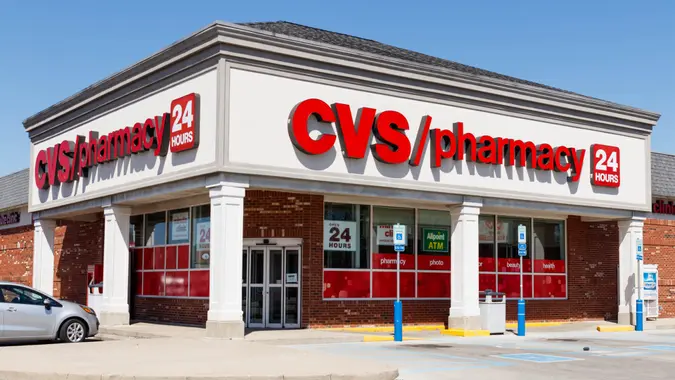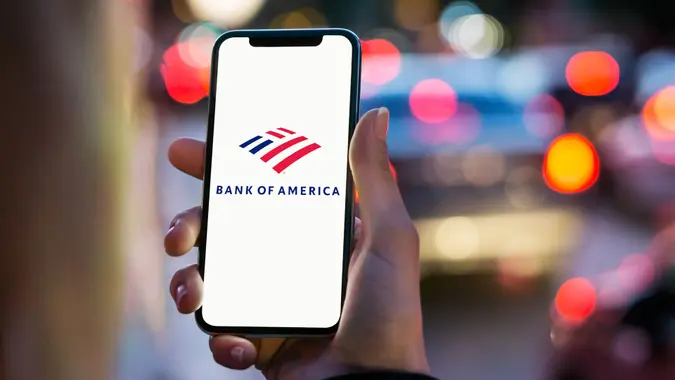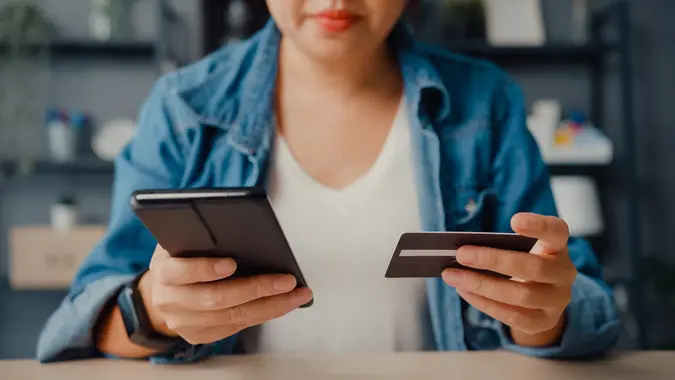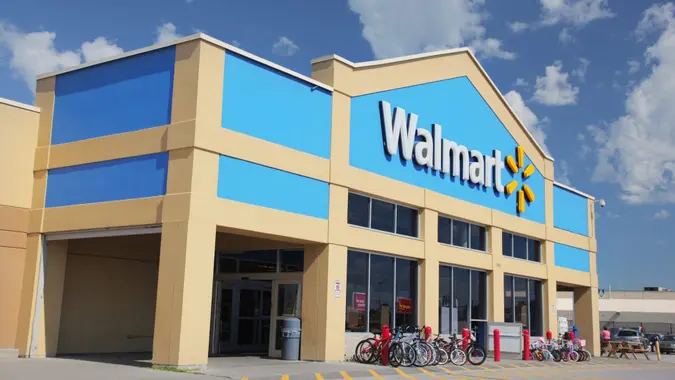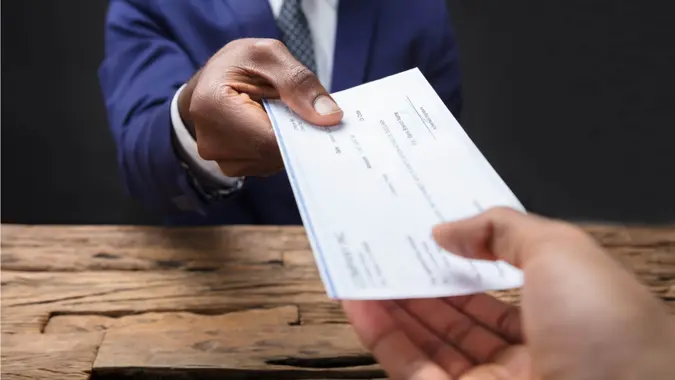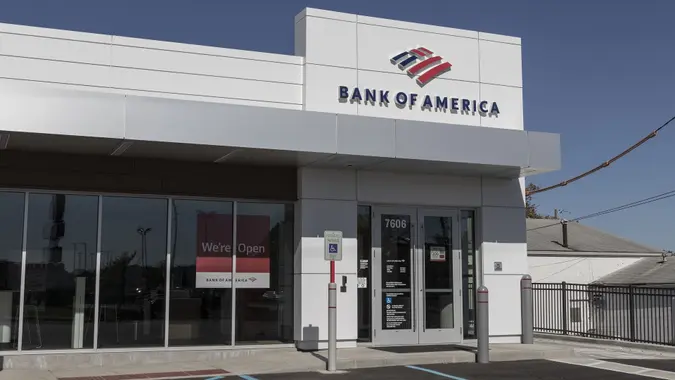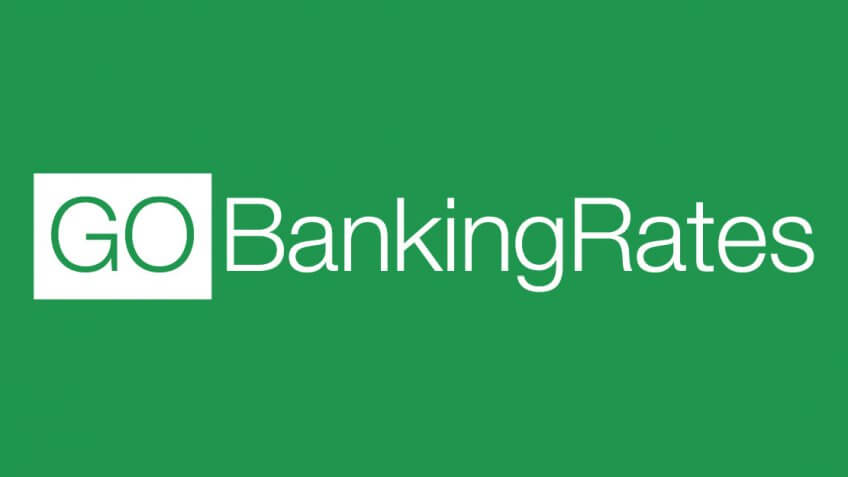Cashier’s Check Scams: How To Avoid Them

Commitment to Our Readers
GOBankingRates' editorial team is committed to bringing you unbiased reviews and information. We use data-driven methodologies to evaluate financial products and services - our reviews and ratings are not influenced by advertisers. You can read more about our editorial guidelines and our products and services review methodology.

20 Years
Helping You Live Richer

Reviewed
by Experts

Trusted by
Millions of Readers
Unlike a personal bank check, which is drawn against the account of the individual who writes it, a cashier’s check is issued by a bank or financial institution. Although cashier’s checks are generally considered safer than personal checks, they’re also used in fake check scams. These scams can leave the victim responsible for reimbursing the bank that deposited or cashed the check.
Learn more about cashier’s checks, how to avoid cashier’s check scams and what to do if you’re a check fraud victim.
Cashier’s Check Scams: How To Avoid Them
Cashier’s checks are generally considered a safe and secure payment method, but can you get scammed on a cashier’s check? Yes — common cashier’s check scams involve getting the victim to deposit a fake check and wire transfer the money back to the scammer. Here are five cashier’s check scams to know and avoid:
Five Cashier’s Check Scams
- Mystery shopper scam
- Craigslist scam
- Work-from-home scam
- Property rental scam
- Foreign lottery scam
Mystery Shopper Scams
Mystery shoppers get paid for making purchases and filling out reports about their experience. Legitimate companies use mystery shoppers to help them find opportunities for improvement.
Scammers hire mystery shoppers for a phony bank or wire transfer service, for which the shopper gets a check to deposit in their account and is asked to wire funds to a third party.
Craigslist Scams
Craigslist scams consist of an offer to purchase your advertised product or service with a request to make a deposit using a cashier’s check.
Alternatively, the scammer might offer a cashier’s check worth more than the purchase price, seemingly as a show of good faith, and ask the seller to refund the extra money via wire transfer.
Work-from-Home Scams
Some scammers offer home-based jobs that pay you for processing payments through your own bank account or promise you a paycheck before you’ve done any work.
For these common scams, the scammer sends the remote worker a check and asks the worker to deposit it into their personal account and wire the additional money to the scammer or a third party.
Property Rental Scams
Property rental scams target both renters and landlords.
Scammers may advertise and accept a deposit for a rental property they don’t actually own or manage.
Posing as a renter, they may pay for the initial rent, deposit and fees with a cashier’s check but back out of the deal at the last minute. When the landlord returns the money, they may discover that the cashier’s check is fraudulent.
Foreign Lottery Scams
Foreign lottery scams take several forms, but the scammer often claims to have won a lottery, inherited money or saved a substantial amount of money in the bank.
Scammers will ask you to deposit a cashier’s check in your account and wire a portion of it back to them. The check will not clear, and the victim will lose the money they wired.
Are Cashier’s Checks Safe?
Legitimate cashier’s checks are nearly risk-free and harder for scam artists to abuse. In fact, they’re a preferred payment method for large transactions, such as real estate purchases. They’re also useful for transactions with individuals you haven’t done business with before.
Cashier’s checks also are guaranteed funds and are traceable in case of a dispute or loss. In addition, payees don’t have to worry about insufficient funds.
How To Spot a Fake Cashier’s Check
Although a phony cashier’s check can look like the real thing, some fakes have telltale signs to tip you off. The Federal Deposit Insurance Corp. and AARP Bulletin offer tips for spotting phony cashier’s checks before depositing the check.
How Can I Verify if a Cashier’s Check Is Real?
- Verify the name of the bank.
- Call the bank’s official phone number — not necessarily the one printed on the check — to verify the check.
- Look for a perforated edge indicating the check was printed on a business printer.
- Note stains, gaps and pen strokes that suggest the signature was scanned or forged.
- Note a poor-quality logo or the absence of a logo.
- Look out for mismatched check numbers found in the top right corner and at the bottom right corner.
- Inspect the ink — fake checks often feature shiny ink used for the check, account and routing numbers at the bottom.
- Read the routing number — one that’s longer or shorter than nine digits is likely fake.
How To Report Cashier’s Check Scams
Contact your bank as soon as you suspect you’ve been scammed and report the scam to the police in order to document the fact that you’re a victim.
The Federal Trade Commission recommends filing complaints with:
- The FTC
- The U.S. Postal Inspection Service
- Your state attorney general
You also should contact the bank whose name was used on the fraudulent check, as well as the website where you met the scammer.
How To Protect Yourself From Cashier’s Check Scams
Here are some tips for avoiding scams and protecting yourself from cashier’s check fraud:
- Avoid work-from-home jobs and mystery shopping jobs that require you to make deposits, wire money or transfer funds.
- Research companies that hire home-based workers and mystery shoppers before you accept a position. Refuse any position that requires an upfront payment.
- Don’t agree to use wire services to send money to strangers.
- If someone makes a purchase from you using a cashier’s check, insist that the check be written for the exact purchase price.
- Only accept cashier’s checks from banks you can contact to confirm that the check is legitimate.
What Happens if You Deposit a Fake Cashier’s Check?
If you cash a fake cashier’s check, which could take weeks to discover, you can lose the money or face criminal charges for check fraud. Not only do you have to pay back the amount of the check, but you also may need to pay additional fees to cover overdraft charges if there’s not enough money in your account to cover the check.
Red Flags of Fake Cashier’s Checks
Spotting red flags on a cashier’s check immediately will help prevent unnecessary hassles in the future. There are obvious visual differences that are easy to spot.
Fake cashier’s checks usually have typos or formatting errors. In addition, if the issuer is pressuring you to cash or deposit the cashier’s check quickly, you may want to call the issuing bank to verify if funds are available.
Other red fags you should look out for:
- Suspicious bank name. If the bank name is unfamiliar, then try to call the bank or verify the bank has a website.
- Mismatched numerical and written amounts. If the numerical amount and the written amount differ, the check may be altered.
- No security features. Cashier’s checks usually have watermarks and security threads. The lack of those marks indicates the check could be fake.
- Unusual overpayment. If the amount is different from what is agreed upon, it could indicate a counterfeit check.
- Generic bank details. If the issuing bank’s name, address or logo looks unprofessional or doesn’t match the actual bank it may be helpful to call the bank before you accept the check.
- Lack of payee information. Absent payee information and issued to “cash” is another indicator of a fake check.
Can Someone Send You a Fake Cashier’s Check?
It is easy for someone to send you a fake cashier’s check. Scammers often use counterfeit cashier’s checks because they are perceived as secure and reliable. These fake checks can be highly convincing, making it difficult for recipients to identify them as fraudulent.
Here are some common real-life scenarios where fake cashier’s checks are sent to individuals.
Real-Life Scenarios Where This Happens
Fake cashier’s checks are a problem in overpayment scams. An individual buys something from you and overpays with a cashier’s check. They ask you to refund the overpaid amount via wire transfer or another method. The check eventually bounces, leaving you responsible for the entire amount.
Individuals can be a victim of lottery or prize scams. You could win a lottery check and be asked to pay taxes on the amount immediately. Once you pay the taxes, the lottery check suddenly bounces.
Scammers can also offer a fake job to you and require you to purchase equipment from the cashier’s check they’ve sent you to cover the expense. Once you’ve paid the vendor, the cashier’s check bounces.
How To Avoid Being a Target
To avoid becoming a target of a fake cashier’s check, consider doing the following:
Verify the check with the issuing bank. Before you deposit the check, call the bank to determine if the check is authentic.
Wait for final confirmation. Even if the bank verifies the funds, wait for a few days before spending that money.
Be aware of overpayment scams. Avoid refunding overpayments or sending funds back to someone who issued a cashier’s check until you’re certain the check is legitimate.
Use trusted parties. Accept cashier’s checks from parties you trust.
Trust your gut. If you feel like there is something not right about the check, verify it before you decide to accept it.
Preventing Cashier’s Checks Scams
To prevent yourself from being a victim of cashier’s check scams, learn how to use best practices for secure transactions.
Make certain you have an awareness of cashier’s check scams and common red flags associated with these transactions. If you’re asked to refund a certain amount because of an overpayment, wait until the cashier’s check clears the bank before sending money. Use trusted people or escrow services to ensure the cashier’s check is legitimate.
When To Use Safer Payment Alternatives
A cashier’s check may not be the best payment method for certain transactions. You want to use safer payment alternatives like online payment platforms, wire transfers or cash when dealing with unknown parties, international payments, recurring transactions or scenarios with a higher risk of fraud.
FAQ
Here are the answers to some of the most frequently asked questions about cashier's check scams.- What can go wrong with a cashier's check?
- Several things can go wrong with a cashier's check even though it is a reliable form of payment. A cashier's check can be counterfeit or stale-dated. A cashier's check can be lost or stolen or a bank can reverse funds or issue a stop payment.
- What are the signs of a fake cashier's check?
- A fake cashier's check may have the following:
- Typos and formatting issues.
- Suspicious bank details or name.
- Mismatched amounts on the check.
- Lack of security features.
- Overpayment of the agreed upon amount.
- Payer's insistence that you cash the check quickly.
- A fake cashier's check may have the following:
- Can a cashier's check bounce after it clears?
- Although it is uncommon, a cashier's check can "bounce" after it clears. If a counterfeit check is initially deposited and then discovered as fake, the bank will reverse the deposit.
- Sometimes the issuing bank can put a stop payment on the cashier's check. This scenario may happen when the check is reported or lost.
- A bank error can cause a cashier's check to bounce, especially when they inadvertently approved a fraudulent check.
- Can your bank reverse a cashier's check?
- Yes, a bank can reverse a cashier's check. A cashier's check can be reversed if it is lost or stolen or counterfeit. Bank error can also cause the reversal of a cashier's check.
Caitlyn Moorhead and Daria Uhlig contributed to the reporting for this article.
Our in-house research team and on-site financial experts work together to create content that’s accurate, impartial, and up to date. We fact-check every single statistic, quote and fact using trusted primary resources to make sure the information we provide is correct. You can learn more about GOBankingRates’ processes and standards in our editorial policy.
- Washington State Department of Financial Institutions. "Cashier's Check Scams."
- Federal Trade Commission. 2022. "How to Spot, Avoid and Report Fake Check Scams."
- Federal Trade Commission. 2022. "Mystery Shopping Scams."
- El Dorado County. "6 Most Common Craigslist Scams."
- Federal Deposit Insurance Corp. "FDIC Consumer News: Beware of Fake Checks."
- AARP Bulletin. 2022. "Fake Check Scams."
- Consumer Federation of America. "Don't Become a Target."
 Written by
Written by  Edited by
Edited by 



